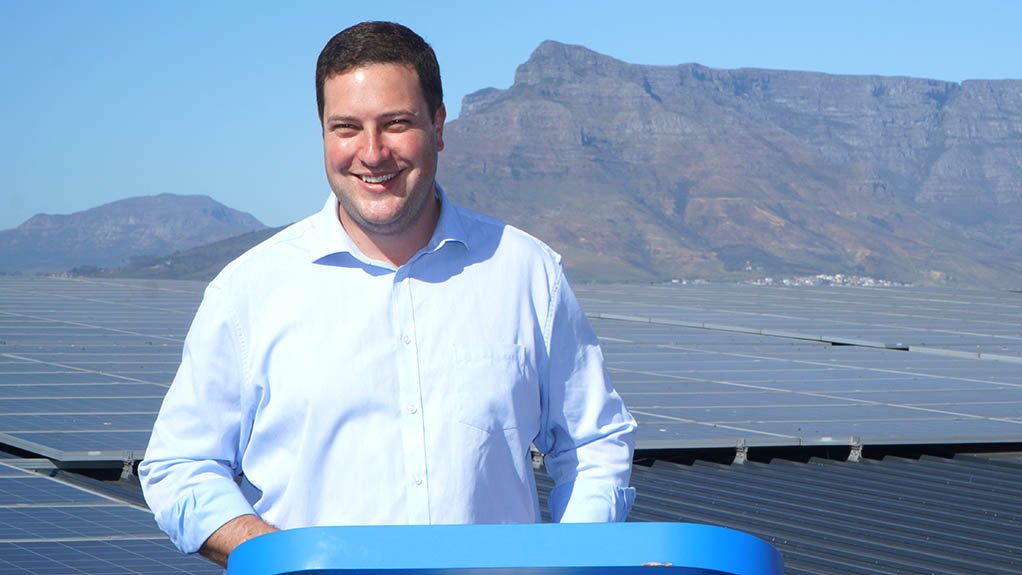The City of Cape Town will start paying cash to commercial and industrial customers to feed power to the grid in an effort to end load-shedding.
Executive Mayor Geordin Hill-Lewis made the announcement on Monday during a discussion session between the City of Cape Town, private commercial consumers and non-profit GreenCape.
Hill-Lewis has set a goal for Cape Town to be the first load-shedding-free city in the country. Among steps taken to enable this, the city has launched a tender to add 300 MW of renewable energy to the grid - this is now at the assessment stage. The City also has started a year-long wheeling pilot project. Once the pilot project is concluded, the wheeling facility will be open to the market.
But the next breakthrough is the City's decision to drop the requirement for its commercial and industrial customers with small-scale embedded generation (or their own power solutions) to be net consumers - which prevented them from producing more power than they consume from the City.
"We would like to end the net consumption requirement for embedded generators, we are doing that for commercial suppliers," he said. This means these customers can now produce as much power as they can, and then feed it to the grid.
The current arrangement is such that the City has a feed-in-tariff and an incentive tariff - to credit the consumer's utility bill for the power fed to the grid, but only until it reaches zero. They can't earn additional revenue after their utility bill is credited to zero. But with this change, after the consumers' utility bill is credited to zero, they will start earning cash for excess power fed to the grid, explained Kadri Nassier, executive director for energy at the City of Cape Town.
"In the past you [would] run a credit until bill zero and couldn't go further than that. Whether you prefer e-wallet, Apple Pay or EFT, it doesn't matter, we will send you money for the power you sell to the City... We will pay actual cash for the power from commercial small-scale embedded generation producers," said Hill-Lewis.
The rate is R1.1c per unit, Hill-Lewis said, but there is scope to make it more attractive.
Hill-Lewis said that getting to this point meant facing "administrative, legal and bureacractic hurdles" from national regulation - in particular, procurement processes. He explained that in order to spend public money to buy power from its customers, the City would be required to launch a tender process, which is impractical and doesn't make sense for what it wants to achieve.
"The way the tender laws were written, before we had a competitive energy grid and the possibility of SSEG (small-scale embedded generation)," said Hill-Lewis. The customers are not competing on the product offered - which is energy - nor on the price, because the municipality sets the tariff.
"There is no point in public competition, because there is nothing to compete about. We want to buy as much as we can."
To find a legal way around the requirement for public competition, small-scale embedded generators are required to register with the city by 31 August. This process will be as "simple and pain-free" as possible, said Hill-Lewis. Once registered, the City can buy power from these customers.
The City is also applying for a permanent exemption from procurement regulations with National Treasury, which will enable it to roll its plan out beyond its commercial customers. However, commercial customers offer the biggest electricity yields compared to residential customers, because of their bigger roof space.
Seraj Chilwan, of solar PV installer ACES Africa, said that the move is a step in the right direction but a lot still has to be done in practical terms. "Moving from being a net consumer to a net producer seems attractive," Chilwan added.
The City could consider a one-to-one tariff, which means a producer could get the same tariff back as what they are paying the City for power. Chilwan said this would be a good incentive to increase the number of solar PV installations.
As at June 2022, there are 2 487 approved, grid-tied small-scale embedded generation systems that are operating. Most are solar PV systems, and there is only one wind system.
EMAIL THIS ARTICLE SAVE THIS ARTICLE
To subscribe email subscriptions@creamermedia.co.za or click here
To advertise email advertising@creamermedia.co.za or click here











